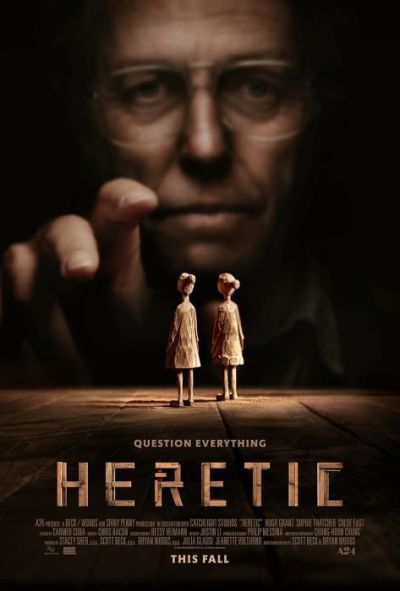'Heretic': Decent horror film with surprisingly deep religious belief talk (review)

SPOILER ALERT:This post contains details about, and a major spoiler for, the movie "Heretic." Don’t read unless you are OK with having a major part of the plot revealed.
I’ve written before in other posts how my oldest daughter and I are fans of scary, thriller movies. So, when we saw the trailer for “Heretic,” we knew we’d be sitting in our usual theater seats for its opening weekend.
From the trailer and initial reviews we read, we thought it was going to be a decent creeper, and we weren’t disappointed. But what I didn’t expect was a movie that presented the heaviest theatrical narrative I’ve seen in a long time about religious belief and disbelief.
Kyle Smith of the Wall Street Journal calls it, “not only an expertly engineered work of suspense but also an ingeniously structured colloquy about the most deeply held belief systems.” I agree that we haven’t seen a movie in a while that goes where this one does.
The film focuses on two young Mormon missionary women (played by Sophie Thatcher and Chloe East) who visit the home of an older man, “Mr. Reed” (played by Hugh Grant) in hopes of converting him to Mormonism. It doesn’t take long for the missionaries to find out that Mr. Reed isn’t as innocent or ignorant of religion as he first pretends.
He begins to rock their world by delivering a sweeping (and accurate) look at some of the darker aspects of Mormonism and then moves on to dispense his broader version of religious history in general. The writers want you to accept the assertion that Mr. Reed has done his homework and is large and in charge when it comes to knowing the truth about all belief systems.
Reed tells the women that his research led him to discover “the one true religion”, which he admits he didn’t want to find.
The rest of the movie is a psychological and suspenseful cat-and-mouse game between Reed and the two women where he leads them to his conclusion about the one true religion.
While Smith’s review of the film says, “the movie itself is not merely disparaging of religion; in a way it is also affirmative, and smartly weaves in supporting points for both sides”, I’m going to respectfully disagree and contend it bends much more towards disbelief. Some of the false material touted in the movie is rhetoric I’ve seen many times before.
“Iterations”
Hugh Grant’s character springboards from Mormonism into a dialogue where he argues that all religions are simply “iterations” of each other. The scriptwriters put in Reed’s mouth a long-debunked claim that started with controversial figures like Bruno Bauer, Albert Kalthoff, and James Frazer with his work The Golden Bough where he argued that widespread worship of dying and rising fertility gods has existed since humankind.
In the movie, Mr. Reed tells the missionaries that Jesus is only a recent duplication of mythical gods like Horus, Dionysus, Tammuz, Mithras, and others, all of whom were virgin-born on December 25th, proclaimed to be a god, died, and came back from the dead. The missionaries attempt to point out issues with Reed’s contentions, but in my opinion, the movie leaves the weight of who’s right in Reed’s corner.
That’s unfortunate as the “iterations” argument about Jesus is demonstrably false and has been definitively skewered many times by scholars who know better. See works like Ronald Nash’s book The Gospel and the Greeks or a presentation I put together on this topic some years ago as examples that showcase the argument’s many flaws.
Grant’s movie character moves on to contend that the missionaries only believe what they do because someone encouraged them to believe it. While they’ve been in his house, Mr. Reed has led the women to think he has a wife who is home and there’s a blueberry pie cooking, and he points out they still believe those things even though he’s given them mounting evidence to the contrary. In his review of the movie for Rogerebert.com, Brian Tallerico says, “After all, they believe in a higher power, as if his wife were in the kitchen. Because they've been told so.”
Here, the movie writers touch on the issue of why we believe the things we do. Authoritarianism (testimony) is one path, which is what the movie focuses on, with other routes being subjectivism, rationalism, empiricism, and pragmatism.
In negatively highlighting the belief-by-authority model, the film subtly saddles up to statements made by atheists such as Richard Dawkins who have argued we are genetically programmed to believe without questioning the word of authority figures, especially parents, and this opens us up at an early age to what they call the “infection” by religion, which they liken to a virus and “warped reality”.
The movie’s final act centers on Mr. Reed leading the women down the path to his conclusion of what the only true religion really is: control.
At this point, the writers are echoing the thinking of Karl Marx who thought religion was a mechanism of domination used by society’s elite to manipulate the masses, saying, “Religion is the self-consciousness and the self-feeling of the man who has either not yet found himself, or else (having found himself) has lost himself once more. This state, this society, produces religion, a perverted world consciousness, because they are a perverted world. Religion is the sigh of the oppressed creature, the heart of a heartless world, just as it is the spirit of a spiritless situation. It is the opium of the people” (Marx’s original emphasis).
At this point, the movie darkly begins depicting how Mr. Reed is practicing his religion, in essence becoming his own god and asserting control over those around him — something that is indeed frightening. Tallerico makes just that observation and starts his review of the movie by asking, “What's scarier than believing in a higher power that controls our every move? Not believing in a higher power at all.”
He's right. At that point, we end up at Dostoevsky’s famous quote: “Without God all things are permitted,” which includes very evil things.
However, no matter how many times the false assertions of Jesus mythicists or atheist philosophers cycle back around in movies like Heretic. The Gospel found in Christianity proclaims that a good and loving God does exist.
Moreover, Scripture emphatically states that the Christian faith is the polar opposite of the “control worldview” “Heretic” and Marx put forward. Jesus said, “So if the Son makes you free, you will be free indeed” (John 8:36) “and you will know the truth, and the truth will make you free” (John 8:32). Paul tells us “It was for freedom that Christ set us free” (Gal. 5:1) and “For you were called to freedom, brethren” (Gal. 5:13).
Lastly, contrary to what the movie suggests, the conviction of these truths rests on solid and objective ground, just as theologian Francis Schaeffer says in his book The God Who is There:
“True Christian faith rests on content. It is not a vague thing which takes the place of real understanding, nor is it the strength of belief which is of value. The true basis for faith is not the faith itself, but the work which Christ finished on the cross. My believing is not the basis for being saved — the basis is the work of Christ. Christian faith is turned outward to an objective person: ‘believe on the Lord Jesus and you shall be saved.’”
In today’s culture, such thinking is indeed becoming the real heresy.
Robin Schumacher is an accomplished software executive and Christian apologist who has written many articles, authored and contributed to several Christian books, appeared on nationally syndicated radio programs, and presented at apologetic events. He holds a BS in Business, Master's in Christian apologetics and a Ph.D. in New Testament. His latest book is, A Confident Faith: Winning people to Christ with the apologetics of the Apostle Paul.




























